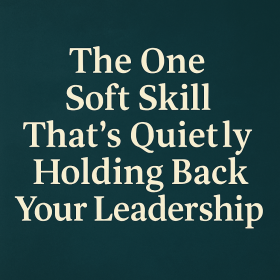
The One Soft Skill That’s Quietly Holding Back Your Leadership
If I asked you to name one soft skill you wish you were better at, what would you say?
Maybe it’s communication—making sure your message lands with clarity instead of being lost in translation.
Or perhaps it’s empathy—truly understanding what your team, clients, or partners are experiencing, even if you haven’t walked in their shoes.
For some, it’s adaptability—being able to pivot when plans, markets, or people don’t go the way you expected.
And for others, it might be influence—leading without forcing, guiding others without needing to control.
Here’s the truth: we all have at least one soft skill that could use a tune-up. And yet, most leaders double down on their technical expertise or their strategic thinking, while leaving these human-centered skills underdeveloped.
That’s a mistake—because in today’s fast-changing business world, soft skills aren’t optional. They’re what separate the good leaders from the great ones.
Why Soft Skills Matter More Than Ever
Think about the last time you were in a high-stakes meeting.
- Did the loudest voice in the room “win,” even if their idea wasn’t the best?
- Did the team leave with more alignment—or more confusion?
- Did people feel heard, valued, and motivated—or dismissed and deflated?
Those outcomes have little to do with technical brilliance and everything to do with soft skills. The ability to listen, manage your emotions, communicate with clarity, and build trust is what transforms meetings into momentum.
Technology, AI, and automation are only accelerating this reality. Machines can analyze data, draft reports, even suggest strategies. But they cannot replace the distinctly human ability to build relationships, inspire people, and lead with presence.
That edge belongs to leaders who invest in their emotional intelligence and interpersonal skills.
The Self-Reflection Question
Here’s a coaching question for you:
“If there were one soft skill that, if you mastered it, would have the biggest positive impact on your leadership and your business—what would it be?”
Be honest with yourself.
If you struggle to hold boundaries without feeling guilty, your area for growth may be assertiveness.
If you avoid difficult conversations, you may need to strengthen your communication.
If you tend to react quickly under pressure, developing emotional intelligence might be your edge.
Clarity begins with self-awareness. Once you identify the soft skill that’s holding you back, you can create a plan to develop it.
A Story to Illustrate
I recently worked with a CEO who admitted that he wished he were better at listening. His team respected him, but in meetings, he had a habit of jumping in with solutions before people finished talking. The result? His leaders felt unheard, and innovation was stifled.
We worked on a simple but powerful shift: instead of reacting immediately, he practiced pausing, paraphrasing what he heard, and then asking, “What else?”
The change was dramatic. His team began speaking up more, decisions were more collaborative, and the CEO himself felt less pressure to always have the answer. That one soft skill—listening—unlocked better results for the entire company.
Building Your Chosen Skill
Soft skills aren’t innate talents you either have or don’t have. They’re learnable, trainable, and improvable with intentional practice. Here’s how to get started:
- Name it. Be clear about the one skill that would make the biggest difference for you.
- Observe yourself. Notice when you’re using it well and when you’re falling short.
- Seek feedback. Ask trusted colleagues how they experience you in this area.
- Practice small. Don’t try to overhaul overnight. Choose one behavior to work on consistently.
- Track progress. Celebrate growth, even if it’s incremental.
Consistency compounds. Over time, these small adjustments reshape how you show up as a leader.
The Ripple Effect
Here’s the best part: when you improve one soft skill, it doesn’t just change you. It changes how your entire team operates.
- Better communication means fewer misunderstandings.
- More empathy means stronger loyalty and engagement.
- Higher adaptability means less fear when markets shift.
- Stronger influence means smoother execution without power struggles.
In other words, when you get better, everyone around you benefits.
Final Thought
Once again, I will ask you:
What’s the one soft skill you wish you were better at?
Lean into that discomfort. Name it. Work on it. And watch how it elevates not only your leadership, but also the culture and performance of your business.
Because the truth is—hard skills may get you in the room. But soft skills are what keep you at the table.


Dr. Patty Ann
